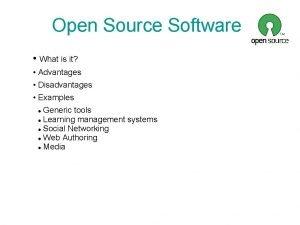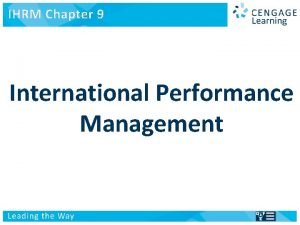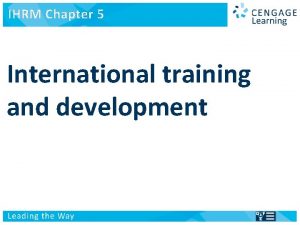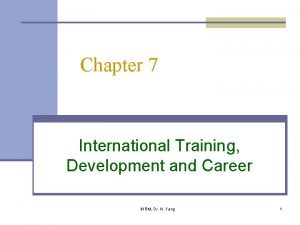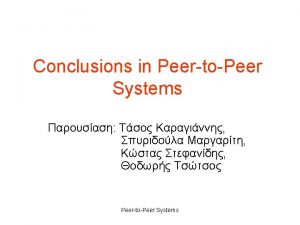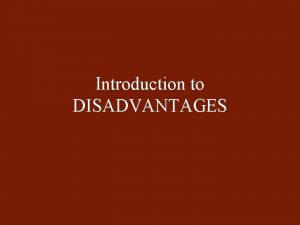Advantages and Disadvantages of Using Local and Expatriate







- Slides: 7

Advantages and Disadvantages of Using Local and Expatriate Employees to Staff International Subsidiaries Locals Advantages • Lower labor costs • Demonstrates trust in local citizenry • Increases acceptance of the company by the local community • Leads to recognition of the company as a legitimate participant in the local economy • Effectively represents local considerations and constraints in the decision-making process © 2001 by Prentice Hall Disadvantages • Makes it difficult to balance local demands and global priorities • Leads to postponement of difficult local decisions (such as layoffs) until they are unavoidable, when they are more difficult, costly, and painful than they would have been if implemented earlier • May make it difficult to recruit qualified personnel • May reduce the amount of control exercised by headquarters 17 -1

Advantages and Disadvantages of Using Local and Expatriate Employees to Staff International Subsidiaries (cont. ) Expatriates Advantages • Cultural similarity with parent company ensures transfer of business/management practices • Permits closer control and coordination of international subsidiaries • Gives employees a multinational orientation through experience at parent company • Establishes a pool of internationally experienced executives • Local talent may not yet be able to deliver as much value as expatriates can © 2001 by Prentice Hall Disadvantages • Creates problems of adaptability to foreign environment and culture • Increases the “foreignness” of the subsidiary • May involve high transfer, salary, and other costs • May result in personal and family problems • Has disincentive effect on localmanagement morale and motivation • May be subject to local government restrictions 17 -2

Pay Comparisons § USI MBA candidates, Engineering undergrad, MNGT 652, Fall 2000 u u u u u Crystalline Maintenance Manager, GE Plastics, Lexan Chemical Operations, Mt. Vernon (10 yrs exp, B. S. U of Idaho) Sourcing Leader, GE Plastics, Mt. Vernon (8 yrs exp, B. S. National University of Colombia, M. S. U of Oklahoma) Staff Engineer, City of Evansville (7 yrs exp, B. S. U of Illinois) Engineering Mngr, Ruvan, Evansville (11 yrs exp, B. S. U of Cincinnati) Lead Process Engineer, Towel Mfg, Kimberly-Clark, Owensboro (3 yrs exp, B. S. Purdue) Environmental Chemist, Alcan Ingot, Sebree, KY (27 yrs exp, B. S. Universidad Pontifica Bolivariana [Colombia] Staff Electrical Engineer, Biagi, Chance, Cummins, London, Titzer, Inc. , Evansville (2 yrs exp, B. S. USI) Plant Mechanical Engineer, SIGECO, Newburgh (9 yrs exp, B. S. UE) Industrial/Process Engineer, DSM Engineering Plastics, Evansville (14 yrs exp, B. S. Ball State) Engineering Manager, ARC Machine, Evansville (15 yrs exp, B. S. UE) © 2001 by Prentice Hall 17 -3

© 2001 by Prentice Hall 17 -4

© 2001 by Prentice Hall 17 -5

Five Major Dimensions to Culture § Power distance Extent to which individuals expect a hierarchical structure that emphasizes status differences between subordinates and superiors. § Individualism Degree to which a society values personal goals, autonomy, and privacy over group loyalty, commitment to group norms, involvement in collective activities, social cohesiveness, and intense socialization. § Uncertainty avoidance Extent to which a society places a high value on reducing risk and instability. § Masculinity/femininity Degree to which a society views assertive or “masculine” behavior as important to success and encourages rigidly stereotyped gender roles. § Long-term/short-term orientation Extent to which values are oriented toward to future (saving, persistence) as opposed to the past or present (respect for tradition, fulfilling social obligation). © 2001 by Prentice Hall 17 -6

EEO in the International Context § U. S. companies are prohibited from basing employment decisions on employee characteristics such as race, sex, and age. This prohibition applies to international assignments, with the single exception that companies are not required to violate a host nation law. § Foreign national employees of U. S. companies in their own country or in some other foreign country are not covered by U. S. employment law. § Under the Immigration Control and Reform Act of 1986, people who are not U. S. citizens but who are living and have legal work status in the United States may not be discriminated against. © 2001 by Prentice Hall 17 -7



